In the season of Thanksgiving, it is customary to look over life and count our blessings. We could be thankful for the opportunities to make new friends, for daily interactions, for the inventions that make our life easier, for the soldiers who face insurmountable odds to save their fellow man. We could also say thanks to food, science, for the imagination of the writers who literally take us out of this world. This week’s reviews from the
Children’s Literature and Reading Special Interest Group present books on a range of issues connecting the young readers with the world at large.
Grades K-2
Brandford, Anna. (2014). Violet Mackerel’s Possible Friend. Illus. by Elanna Allen. New York, NY: Athenum
 Violet has just moved into a new home and while everyone is busy unpacking and putting things away, she walks around the house. When she finds a fence, Violet pushes something soft to create a hole in the fence. She worries that she has broken the fence and might be in trouble, but soon, a letter from “Rose” appears in the hole. Thus begins Violet’s adventure in a new home to find new friends. Her elder sister helps Violet a little, but it is up to Violet to make friends with Rose. And they do so in delicious fashion, with letters, thoughtful gifts, but more importantly respect for each other. This is a wonderful book for young readers with moments for the young readers to be thankful about many things in their lives, without once explicitly saying so.
Violet has just moved into a new home and while everyone is busy unpacking and putting things away, she walks around the house. When she finds a fence, Violet pushes something soft to create a hole in the fence. She worries that she has broken the fence and might be in trouble, but soon, a letter from “Rose” appears in the hole. Thus begins Violet’s adventure in a new home to find new friends. Her elder sister helps Violet a little, but it is up to Violet to make friends with Rose. And they do so in delicious fashion, with letters, thoughtful gifts, but more importantly respect for each other. This is a wonderful book for young readers with moments for the young readers to be thankful about many things in their lives, without once explicitly saying so.
—Rani Iyer, Washington State University Pullman
Mccormick, Scott. (2014). Mr. Pants: It’s Go Time! Illus. by R. H. Lazzell. New York, NY: Dial Books for Young Readers.
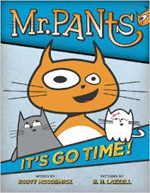 It can be hard for younger family members to hold on to their own plans or synch with others. Mr. Pants, however, learns that he could enjoy dressing up dolls with his sister in fairy princess dream factory, shopping with his mom, and finally get to play the laser tag he so desperately wants to play. He is sure he will win. Waiting is really hard for Mr. Pants, but he manages to entertain himself with help from his sister, brother, and cardboard boxes! Bold illustrations and combination of picture book and comic book format is especially appealing for younger readers. This is a good book to keep the youngsters grinning while reading.
It can be hard for younger family members to hold on to their own plans or synch with others. Mr. Pants, however, learns that he could enjoy dressing up dolls with his sister in fairy princess dream factory, shopping with his mom, and finally get to play the laser tag he so desperately wants to play. He is sure he will win. Waiting is really hard for Mr. Pants, but he manages to entertain himself with help from his sister, brother, and cardboard boxes! Bold illustrations and combination of picture book and comic book format is especially appealing for younger readers. This is a good book to keep the youngsters grinning while reading.
—Rani Iyer, Washington State University Pullman
Grades 3-5
Davis, Kathryn Gibbs. (2014). Mr. Ferris and His Wheel. Illus. by Gilbert Ford. New York, NY: Mifflin Harcourt Publishing.
 In 1893, just 10 months before the World Fair, America was empty of ideas to impress the world. France had dazzled the world with the Eiffel Tower in the 1889 fair. The contest to produce the next masterpiece had yielded no results. In Pittsburgh, George Ferris and his partner William Gronau had a plan. They measured and re-measured the calculations. It had to be perfect. It was to be America’s pride. The judges could not decide. It was too delicate. It was big. It moved. It was an attraction like none other. Finally, four-months before the event, he got the go-ahead. No banks would fund the venture, so George put in his own savings and convinced few wealthy investors to join him. Work started in January 1893 when the ground was frozen and digging 35 feet down to plant towers of steel seemed to take forever. The axle of the device weighed 70 tons! With two months to go, an enormous circle stood in place. At 834 feet in circumference and rising 265 feet, the marvel was crafted to move with the precision of the finest watch. If you visit any fairs this year, don’t forget to thank Mr. Ferris for his wonderful invention.
In 1893, just 10 months before the World Fair, America was empty of ideas to impress the world. France had dazzled the world with the Eiffel Tower in the 1889 fair. The contest to produce the next masterpiece had yielded no results. In Pittsburgh, George Ferris and his partner William Gronau had a plan. They measured and re-measured the calculations. It had to be perfect. It was to be America’s pride. The judges could not decide. It was too delicate. It was big. It moved. It was an attraction like none other. Finally, four-months before the event, he got the go-ahead. No banks would fund the venture, so George put in his own savings and convinced few wealthy investors to join him. Work started in January 1893 when the ground was frozen and digging 35 feet down to plant towers of steel seemed to take forever. The axle of the device weighed 70 tons! With two months to go, an enormous circle stood in place. At 834 feet in circumference and rising 265 feet, the marvel was crafted to move with the precision of the finest watch. If you visit any fairs this year, don’t forget to thank Mr. Ferris for his wonderful invention.
—Rani Iyer, Washington State University Pullman
Maihack, Mike. (2014). Cleopatra in Space 1: Target Practice. New York, NY: Graphix.
 This graphic novel is about young Cleopatra—yes, that Cleopatra. When she is zapped far, far into the future on her birthday/coronation day is surprised to be treated as the savior. Here, she is enrolled in Yasiro Academy, a high-tech school with boring classes like algebra, biology, alien languages and her favorite, combat training. But, while being trained to be a leader she is still fighting to complete her homework she is learning about making friends and getting along with everyone in her class. Refreshing illustrations and fast paced story will engage all the readers. Best in combat, Cleo is tested repeatedly in this first book of the series. This is the first of the series of Cleo book. This book is included to let students be thankful for who they are. Whoever they are, they are special in every way.
This graphic novel is about young Cleopatra—yes, that Cleopatra. When she is zapped far, far into the future on her birthday/coronation day is surprised to be treated as the savior. Here, she is enrolled in Yasiro Academy, a high-tech school with boring classes like algebra, biology, alien languages and her favorite, combat training. But, while being trained to be a leader she is still fighting to complete her homework she is learning about making friends and getting along with everyone in her class. Refreshing illustrations and fast paced story will engage all the readers. Best in combat, Cleo is tested repeatedly in this first book of the series. This is the first of the series of Cleo book. This book is included to let students be thankful for who they are. Whoever they are, they are special in every way.
—Rani Iyer, Washington State University Pullman
Grades 6-8
McCallum, Ann. (2014). Eat Your Science Homework: Recipes for Inquiring Minds. Illus. by Leeza Hernandez. Watertown, MA: Charlesbridge.
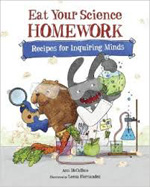 We can eat our science homework! Based on the scientific method, families all around the country can prepare delicious recipes understanding the underlying science. Recipes include Atomic Popcorn Balls, Density Dressing and Veggies Sticks, Invisible Ink Snack Pockets, Loop, Whorl, and Arch Cookies, Sedimentary Pizza Lasagna, and Black Hole Swallow-Ups. Each of the recipes has a scientific explanation of the chemistry provided for them. Entertaining sidebars explain the scientific history and scientific reasoning behind the themes. The scientific explanations are further broken down into real-life easy-to-understand examples. This is a great book for celebrations or even for a class to enjoy cooking and learning science.
We can eat our science homework! Based on the scientific method, families all around the country can prepare delicious recipes understanding the underlying science. Recipes include Atomic Popcorn Balls, Density Dressing and Veggies Sticks, Invisible Ink Snack Pockets, Loop, Whorl, and Arch Cookies, Sedimentary Pizza Lasagna, and Black Hole Swallow-Ups. Each of the recipes has a scientific explanation of the chemistry provided for them. Entertaining sidebars explain the scientific history and scientific reasoning behind the themes. The scientific explanations are further broken down into real-life easy-to-understand examples. This is a great book for celebrations or even for a class to enjoy cooking and learning science.
—Rani Iyer, Washington State University Pullman
Grades 9-12
Atkinson, Rick. (2014). D-Day: The Invasion of Normandy, 1944. New York, NY: Henry Holt and Company.
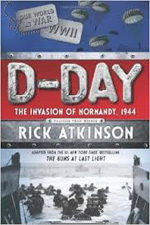 When Allied Forces landed on the beaches on Normandy, they changed the course of the war, coming by sea and by sky. The book provides detailed portrayal of the events culminating in the landing and is the abridged version of the adult book The Guns at Last Light. The world would not be the same today if it was not for the bravery and sacrifices of the soldiers on that beach. The book is included here as a salute to the brave American soldiers serving all over the world.
When Allied Forces landed on the beaches on Normandy, they changed the course of the war, coming by sea and by sky. The book provides detailed portrayal of the events culminating in the landing and is the abridged version of the adult book The Guns at Last Light. The world would not be the same today if it was not for the bravery and sacrifices of the soldiers on that beach. The book is included here as a salute to the brave American soldiers serving all over the world.
—Rani Iyer, Washington State University Pullman
McCahan, Erin. (2014). Love and Other Foreign Words. New York, NY: Dial Books.
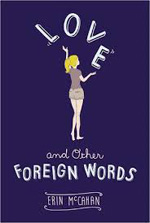 Try some translations with the teenagers in your life and the results can be both amusing and interesting. Josie, a normal teenager, has a language problem. Sheis familiar with the lingua of high school, friends, boyfriends, and all that. But the most difficult is the language of love. As Josie explores this language, she has to unravel her relationship with her sister, Katie, her best friends, and her parents. As her sister Katie prepares for her wedding, cell phone text updates add an important piece to the plot. However, it is with Stu Parks, her best friend, her neighbor, her buddy that in her exploration of the language peaks. After talking to him, telling him everything, and just enjoying the silences, she wishes that he would speak. “I want him to rudely interrupt the silence with the questions about what is on my mind because what is on my mind is this: I don’t know what to say to you now. And I want you tell me, “Everything’s going to be okay.” And the language changes when Stu kisses Josie and forces her to ask herself if this was language of love too. “I feel and suffer my connection to him. Our unique bond of friendship and lifelong history has become all the more palpable because of its injury.” Josie needs time and space to sort this out. As Josie deciphers the language of love, readers cheer her with laughter and love in this lighthearted, heartwarming story.
Try some translations with the teenagers in your life and the results can be both amusing and interesting. Josie, a normal teenager, has a language problem. Sheis familiar with the lingua of high school, friends, boyfriends, and all that. But the most difficult is the language of love. As Josie explores this language, she has to unravel her relationship with her sister, Katie, her best friends, and her parents. As her sister Katie prepares for her wedding, cell phone text updates add an important piece to the plot. However, it is with Stu Parks, her best friend, her neighbor, her buddy that in her exploration of the language peaks. After talking to him, telling him everything, and just enjoying the silences, she wishes that he would speak. “I want him to rudely interrupt the silence with the questions about what is on my mind because what is on my mind is this: I don’t know what to say to you now. And I want you tell me, “Everything’s going to be okay.” And the language changes when Stu kisses Josie and forces her to ask herself if this was language of love too. “I feel and suffer my connection to him. Our unique bond of friendship and lifelong history has become all the more palpable because of its injury.” Josie needs time and space to sort this out. As Josie deciphers the language of love, readers cheer her with laughter and love in this lighthearted, heartwarming story.
—Rani Iyer, Washington State University Pullman
Tougias, Michael & Sherman, Casey. (2014). The Finest Hours: The True Story of a Heroic Sea Rescue. New York, NY: Henry Holt & Co.
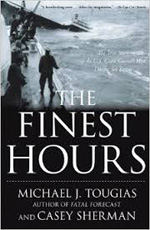 Everywhere we travel we are sure we are in company of people who know what to do when we are in danger. We know that there are ways to protect ourselves and there are people who are trained to act and save lives during an emergency. It makes our lives much smoother and easier. The book is included to express gratitude for the brave people who undertake complicated and dangerous tasks with compassion and need to help another human being. This astonishing tale of bravery comes from real life events in February 1952, when two oil-tankers were torn apart in ferocious storms near the coast of Cape Cod. The title is divided into three parts: the Chatham Lifeboat Station, the response to the capsizing of Mercer, and the burden of being a hero. Bernie Webber, the man of the hour, lived by the creed he had learned in this coast guard school. He was trained to keep his eye on the ball, no matter what. And prove his worth he did. This is non-fiction at its best, tearing you up, yet keeping your heart glowing. A special thanks to all the coastguards and navy personnel out in the seas.
Everywhere we travel we are sure we are in company of people who know what to do when we are in danger. We know that there are ways to protect ourselves and there are people who are trained to act and save lives during an emergency. It makes our lives much smoother and easier. The book is included to express gratitude for the brave people who undertake complicated and dangerous tasks with compassion and need to help another human being. This astonishing tale of bravery comes from real life events in February 1952, when two oil-tankers were torn apart in ferocious storms near the coast of Cape Cod. The title is divided into three parts: the Chatham Lifeboat Station, the response to the capsizing of Mercer, and the burden of being a hero. Bernie Webber, the man of the hour, lived by the creed he had learned in this coast guard school. He was trained to keep his eye on the ball, no matter what. And prove his worth he did. This is non-fiction at its best, tearing you up, yet keeping your heart glowing. A special thanks to all the coastguards and navy personnel out in the seas.
—Rani Iyer, Washington State University Pullman
These reviews are submitted by members of the International Reading Association's Children's Literature and Reading Special Interest Group (CL/R SIG) and are published weekly on Reading Today Online.